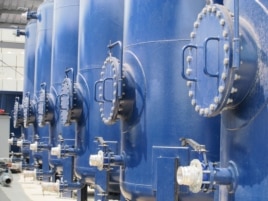
By Marianne Brown
Beaver County Peace Links via Voice of America
April 19, 2014 - Government officials from the U.S. and Vietnam attended a ceremony Saturday marking the next stage in the cleanup process of one of the Vietnam War's deadliest legacies - Agent Orange.
 The herbicide was sprayed by the U.S. military as a defoliant to destroy jungle cover for communist troops. Its highly toxic byproduct, dioxin, has been linked to diseases such as diabetes, cancer and birth defects.
The herbicide was sprayed by the U.S. military as a defoliant to destroy jungle cover for communist troops. Its highly toxic byproduct, dioxin, has been linked to diseases such as diabetes, cancer and birth defects.
The $84 million project, officially launched in 2012, aims to clean up contaminated soil by cooking it at high temperatures.
On Saturday, a group of visiting U.S. senators and congressmen crowded together at one of 28 so-called dioxin “hotspots” in the country, the former U.S. air base at Da Nang, in central Vietnam, where Agent Orange was stored. They hit a giant start button to initiate the clean up.
"We built a containment structure roughly the size of a football field and filled it with 45,000 cubic meters of dioxin-contaminated soil," said U.S. Ambassador to Vietnam David Shear.
 "Beginning today the contaminated soil will be heated to extremely high temperatures to destroy dioxin. After approximately four months the soil will be tested to confirm that the project cleanup goals have been achieved," he said.
"Beginning today the contaminated soil will be heated to extremely high temperatures to destroy dioxin. After approximately four months the soil will be tested to confirm that the project cleanup goals have been achieved," he said.
Healing the wounds of war has been an important issue for the two countries since diplomatic relations were normalized nearly two decades ago. The cleanup has become a symbol of progress and cooperation between the two governments.
According to U.S. Senator Patrick Leahy, who led the congressional delegation, the project has four goals.
"[The first is] to eliminate the danger from dioxin to people living here. Second, to show that for so many years, the U.S. didn’t ignore this problem, we returned to take care of it. Third, our two countries can work together on an issue that for more than three decades was an obstacle for better relations. Fourth, [we want] to improve services for people with disabilities regardless of the cause, including what may have been caused by Agent Orange," Leahy said. An environmental assessment is now being carried out at another former air base, Bien Hoa.
US avoids liability
While the U.S. continues to pump money into funding the Agent Orange cleanup and helping people with disabilities in Vietnam, Washington has never admitted liability for health problems caused by dioxin.
"America is trying to avoid all the one-to-one compensation cases by arguing the scientific basis is not clear, you have no basis, you don’t know what the genetics of the people were to begin with. That’s what a good defense lawyer would do," according to Carl Thayer, a professor at Australia's University of New South Wales.
In 2004 a group of Vietnamese took the chemical companies that produced Agent Orange to court in the U.S., but a federal judge dismissed the case on the grounds that use of the defoliant did not violate international law at the time.
The U.S. also helps in programs aimed at dealing with unexploded ordnance (UXO) and landmine contamination in Vietnam.
But neither the United States nor Vietnam has signed the 1997 Mine Ban Treaty - Vietnam citing national security concerns, especially border security.
One expert who works in the field of UXO clearance - who did not want to be named - said this is because Vietnam is reluctant to clear mines on its border with China.
While the cleanup project has prompted many to reflect on the wounds of war, Vietnam's Vice Minister of National Defense Nguyen Chi Vinh said it is an opportunity to look to the future.
He said he believed the success of the Agent Orange project lies not in the fixing of past issues, but in opening a new road for the future.
"President Obama and President Sang inaugurated the new U.S.-Vietnam comprehensive partnership last summer. I can think of no better example for our growing friendship than this project," said Ambassador Shear.
http://www.voanews.com/content/war-legacy-haunts-vietnam-us-relations/1896904.html

No comments:
Post a Comment